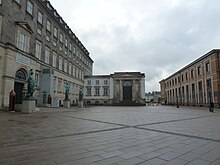| Revision as of 02:14, 24 September 2015 editE.M.Gregory (talk | contribs)Autopatrolled, Extended confirmed users45,004 edits →The building: adding style← Previous edit | Revision as of 11:18, 25 September 2015 edit undoE.M.Gregory (talk | contribs)Autopatrolled, Extended confirmed users45,004 edits improve referenceNext edit → | ||
| Line 6: | Line 6: | ||
| ==The building== | ==The building== | ||
| ] | ] | ||
| The building is strongly inspired by antique Greek architecture and built around an inner courtyard where the artist is buried. The courtyard is particularlarly notable being painted in Eqyptian motifs, tall date palms, lions and crocodile prowl among exotic birds and plants.<ref name=Bente>{{cite web|last1=Bente|first1=Lang|title=Thorvaldsen's Museum: Architecture, Colours, Light|url=Danish Architectural Press, 2002|website=Danish Architectural Press, 2002|publisher=University of Michigan Press |
The building is strongly inspired by antique Greek architecture and built around an inner courtyard where the artist is buried. The courtyard is particularlarly notable being painted in Eqyptian motifs, tall date palms, lions and crocodile prowl among exotic birds and plants.<ref name=Bente>{{cite web|last1=Bente|first1=Lang|title=Thorvaldsen's Museum: Architecture, Colours, Light|url=Danish Architectural Press, 2002|website=Danish Architectural Press, 2002|publisher=University of Michigan Press}}</ref> The Egyptian influence on the exterior is more chaste, here enormous doors in severe trapezoidal style define the architect's intentions to pay homage at once to ], ] and Egyptian style.<ref name=Bente/> It is particularly noteworthy for its unique use of colors both inside and outside. Every room in the museum has a unique ceiling decoration in the ] style. The outside is adorned with a ] depicting Thorvaldsen's homecoming from Rome in 1838 made by ]. | ||
| <ref>{{cite web|url=http://www.thorvaldsensmuseum.dk/museet/thorvaldsens_museum/frisen|title=Sonnes frise|publisher=Thorvaldsens Museum|accessdate=2009-06-24}}</ref> | <ref>{{cite web|url=http://www.thorvaldsensmuseum.dk/museet/thorvaldsens_museum/frisen|title=Sonnes frise|publisher=Thorvaldsens Museum|accessdate=2009-06-24}}</ref> | ||
Revision as of 11:18, 25 September 2015

The Thorvaldsen Museum is a single-artist museum in Copenhagen, Denmark, dedicated to the art of Danish neoclassicistic sculptor Bertel Thorvaldsen (1770–1844), who lived and worked in Rome for most of his life (1796–1838). The museum is located on the small island of Slotsholmen in central Copenhagen next to Christiansborg Palace. Designed by Michael Gottlieb Bindesbøll, the building was constructed from 1838-48 following a public collection of funds in 1837.
The building

The building is strongly inspired by antique Greek architecture and built around an inner courtyard where the artist is buried. The courtyard is particularlarly notable being painted in Eqyptian motifs, tall date palms, lions and crocodile prowl among exotic birds and plants. The Egyptian influence on the exterior is more chaste, here enormous doors in severe trapezoidal style define the architect's intentions to pay homage at once to Attic Greek, Pompeiian and Egyptian style. It is particularly noteworthy for its unique use of colors both inside and outside. Every room in the museum has a unique ceiling decoration in the grotesque style. The outside is adorned with a frieze depicting Thorvaldsen's homecoming from Rome in 1838 made by Jørgen Sonne.
Collections
The museum displays a comprehensive collection of the artist's works in marble as well as plaster, including the original plaster models used in the making of cast bronze and marble statues and reliefs, which are now on display in museums, churches, and at other locations around the world. The museum also features paintings, Greek, Roman and Egyptian antiques, drawings, and prints that Thorvaldsen collected during his lifetime, as well as a wide array of personal belongings that he used in his work and everyday life.
Gallery
- Thorvaldsen Museum
-
Interior view of Thorvaldsens Museum, Copenhagen, Denmark
-
Thorvaldsens Museum gallery
-
 Gratier med Amors pil
Gratier med Amors pil
-
Hallway
-
 Art historian Dr. Bernd Schälicke examines Bertel Thorvaldsen´s sculpture of Adonis
Art historian Dr. Bernd Schälicke examines Bertel Thorvaldsen´s sculpture of Adonis
-
Il pastore
-
 Cupid
Cupid
-
Young Dancing Girl
-
Room
-
Painting from Thorvaldsen's own collection
-
 Painting from Thorvaldsen's own collection by
Painting from Thorvaldsen's own collection by
-
Bowl from Thorvaldsens Museum
External links
References
- ^ Bente, Lang. . Danish Architectural Press, 2002. University of Michigan Press.
{{cite web}}: Check|url=value (help) - "Sonnes frise". Thorvaldsens Museum. Retrieved 2009-06-24.
55°40′36″N 12°34′42″E / 55.6767°N 12.5783°E / 55.6767; 12.5783
Categories: